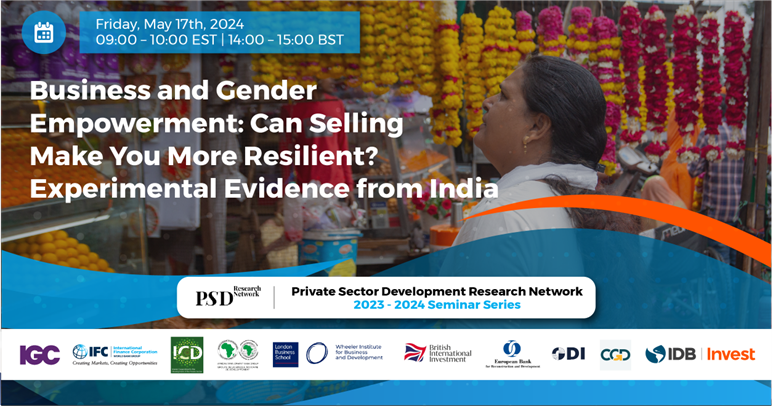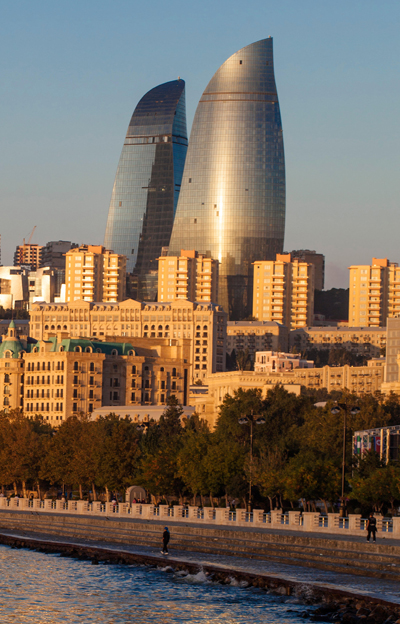
Business and Gender Empowerment: Can Selling Make You More Resilient? Experimental Evidence from India
Organized by the Private Sector Development Research Network
Hosted by The Wheeler Institute for Business and Development
Moderated by Rajesh Chandy, Co-Academic Director, The Wheeler Institute for Business and Development
Friday, 17 May 2024, from 9-10am EST / 2-3pm BST
ABOUT THE SEMINAR:
The research that will be discussed during this seminar is ‘Can Selling Make You More Resilient? Experimental Evidence from India’.
Sudden, devastating external shocks are all too common in many communities around the world. Resilience – the ability to cope with adversity – is a crucial factor in overcoming such conditions. To build resilience among vulnerable communities, many governments, NGOs, and businesses have introduced programs to offer financial, physical, and material support to those most in need. However, a well-documented feature of support programs for the economically and socially disadvantaged is that many individuals fail to take-up the benefits for which they are eligible.
This research explores, through a randomized controlled trial involving 1,048 women in rural India during the COVID-19 pandemic, a marketing solution to building resilience among vulnerable communities and addressing the low take-up of relief programs. We propose that beyond earning an income, employment in sales roles can help individuals build resilience to potentially debilitating shocks. We offer a mechanism through which sales employment improves resilience: by facilitating opportunities to connect with informed and influential others. Moreover, we contend that sales employment has the greatest impact – in terms of enhancing resilience to adversity – for individuals from the most socially isolated groups within a community. Our results indicate that sales employment significantly improves resilience by raising awareness of, and ability to access, external sources of help. In rural India, the impact of sales employment on resilience is highest for those from the most marginalized castes. This study is the first to causally estimate the impact of different forms of employment on resilience, revealing the transformative potential of marketing employment.
Background information about the research can be found here.
ABOUT THE SPEAKERS:
Iris Steenkamp
Assistant Professor of Marketing at Bocconi University
Dr. Iris Steenkamp is an assistant professor at Bocconi University and holds a PhD in marketing from London Business School. Her research explores the impact of marketing (as an intervention or a mechanism) in emerging markets. By implementing large-scale field experiments, her research aims to provide a new perspective on central marketing concepts by linking these to key social and economic development outcomes. Ongoing projects examine the impact of sales employment on gender empowerment and resilience in India and the effectiveness of loyalty programs in a supplier-company setting in Rwanda. Her dissertation has been recognized by various institutions, including the American Marketing Association, INFORMS, and the Research and Development Management Association.
Rajesh Chandy
Professor of Marketing at London Business School, Co-Academic Director of the Wheeler Institute for Business and Development
Dr. Rajesh Chandy served a Co-Editor of the Journal of Marketing special issue on “Better Marketing for a Better World,” and is also co-editor of the Management Science special issue on “Business and Climate Change.” He previously served as an Area Editor for the Entrepreneurship and Innovation area at Management Science.
During 2006-2008, Dr. Chandy served as a member of the US Secretary of Commerce Advisory Committee on Measuring Innovation in the 21st Century Economy. He currently serves as an Independent Director on the board of Laurus Labs Limited, a publicly listed pharmaceutical company, and on the Board of Governors of London Business School.
He received his PhD from the University of Southern California. In 2018, he was elected a Fellow of the British Academy.





